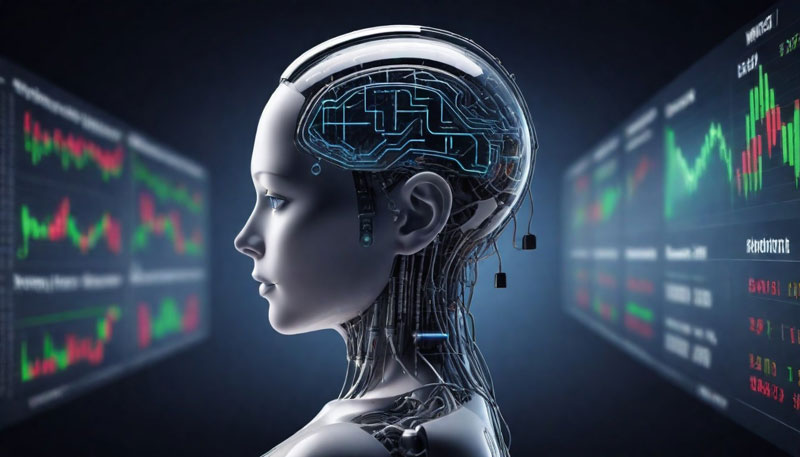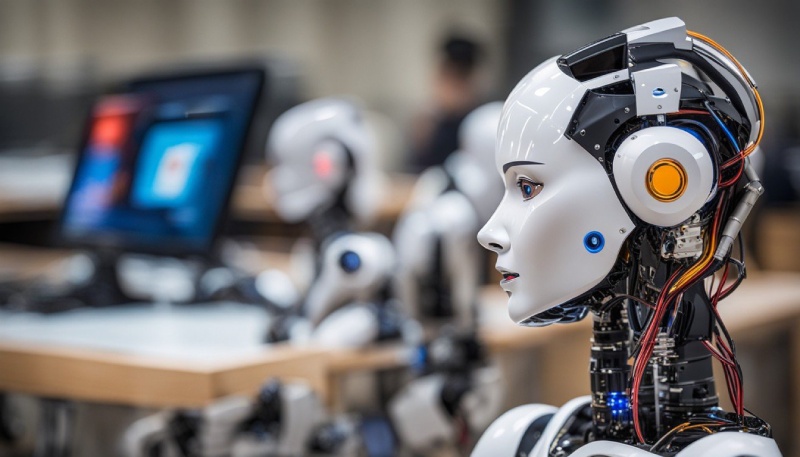Predicting the stock market has long been a pursuit that has captured the imagination of investors, analysts, and technologists alike. With the advent of artificial intelligence (AI) and machine learning (ML) technologies, there was a surge in optimism that these advanced algorithms could unlock the secrets of the stock market and provide lucrative insights for investors. However, despite significant advancements in AI and the proliferation of sophisticated predictive models, accurately forecasting stock prices remains an elusive challenge. In this introduction, we delve into the complexities of stock market prediction and explore the inherent limitations that hinder AI’s ability to consistently predict stock market movements.
AI vs ML vs Statistics – What are the differences
Top 20 Jobs that are Being Replaced by AI Right Now
Embark on Your AI Journey: Top 10 Mini Projects for AI Students
you may be interested in the above articles in irabrod.

Can AI Predict the Stock Market ?
Can AI Predict the Stock Market ?
Answer in Simple Language
Imagine trying to predict who will win a soccer game. Sometimes it’s easy, like if the best team is playing against the worst team. But other times, it’s really hard because there are so many factors that can affect the game, like the players’ skills, the weather, or even luck. Predicting the stock market is a lot like that, but even trickier! There are so many things that can make stock prices go up or down, like company news, economic changes, or even what people are feeling that day. Even though AI is really smart, it’s still learning how to understand all these factors and make accurate predictions. So, just like it’s hard to know for sure who will win a soccer game, it’s also hard for AI to predict what will happen in the stock market.
Scientific Explanation
PAC Learnability
PAC-learnability, or Probably Approximately Correct learnability, is a concept in artificial intelligence and machine learning. It’s about finding algorithms that can learn from data and make predictions with high accuracy most of the time. Imagine you have a teacher who gives you a bunch of examples to learn from, like pictures of cats and dogs, and you need to figure out how to tell them apart. A PAC-learnable algorithm would be able to learn from these examples and correctly identify new pictures of cats and dogs most of the time, even if it’s not perfect every single time. So, PAC-learnability is all about finding algorithms that can learn well from data and make good predictions in the real world.
PAC-learnability, or Probably Approximately Correct learnability, is a theoretical framework in machine learning that deals with the learnability of concepts. In the context of predicting the stock market, PAC-learnability suggests that a machine learning algorithm should be able to learn a model that approximately predicts future stock prices with high probability based on a sample of historical data.
However, there are several reasons why AI struggles to predict the stock market effectively, even within the framework of PAC-learnability:
1. Complexity of Financial Markets: Financial markets are incredibly complex, with countless variables influencing stock prices, including economic indicators, company performance, investor sentiment, geopolitical events, and more. Capturing all relevant factors and their interactions accurately in a predictive model is extremely challenging.
2. Non-stationarity: Financial markets are dynamic and non-stationary, meaning that the underlying relationships between variables can change over time. Models trained on historical data may not generalize well to future market conditions, leading to poor predictive performance.

why Cant AI Predict the Stock Market ?
3. High Dimensionality: Stock market data often involve a high-dimensional feature space, with a large number of potentially relevant variables. Handling such high-dimensional data requires sophisticated modeling techniques and extensive computational resources.
4. Randomness and Noise: Stock prices are influenced by numerous random and unpredictable factors, such as news events, rumors, or sudden shifts in investor sentiment. These sources of noise can obscure meaningful patterns in the data and make accurate prediction difficult.
5. Market Efficiency: The stock market is generally considered efficient, meaning that stock prices reflect all available information at any given time. Efficient markets make it challenging for predictive models to consistently outperform the market, as any exploitable patterns are quickly exploited by traders, leading to price adjustments.
While PAC-learnability provides a theoretical framework for understanding the learnability of concepts in machine learning, predicting the stock market remains a highly challenging task due to the inherent complexity and uncertainty of financial markets. Despite advances in AI and machine learning, successful stock market prediction requires a deep understanding of financial markets, economic fundamentals, and human behavior, factors that are difficult to capture in automated prediction models.
Other Explanations
Predicting the stock market accurately is notoriously difficult due to its complexity and the involvement of numerous unpredictable factors. Here are several reasons why AI struggles to predict the stock market:
1. Non-linearity: Stock market data often exhibit non-linear patterns, meaning that relationships between different variables are not straightforward. AI algorithms typically work best with linear relationships, making it challenging to capture the complex interactions in stock market data.
2. High Dimensionality: Stock market data involve a large number of variables, including economic indicators, company financials, market sentiment, geopolitical events, and more. Handling such high-dimensional data poses challenges for AI models, which may struggle to discern relevant patterns from noise.
3. Noise and Randomness: Stock prices are influenced by a multitude of factors, many of which are random or unpredictable, such as sudden news events, rumors, or market sentiment shifts. These sources of noise can obscure meaningful patterns in the data and make accurate predictions challenging.
4. Market Efficiency: The stock market is generally considered efficient, meaning that stock prices reflect all available information at any given time. Efficient markets make it difficult for AI algorithms to consistently outperform the market, as any exploitable patterns are quickly exploited by traders, leading to price adjustments.
5. Adaptive Market Dynamics: The stock market is dynamic and adaptive, with market participants constantly adjusting their strategies in response to new information and changing market conditions. AI models trained on historical data may struggle to adapt to evolving market dynamics, leading to poor performance in real-time trading scenarios.
6. Black Swan Events: Unforeseen events, often referred to as “black swan” events, can have significant and unpredictable impacts on the stock market. These events, such as natural disasters, geopolitical crises, or unexpected technological breakthroughs, are inherently difficult to anticipate and incorporate into AI models.
While AI techniques have shown promise in analyzing financial data and identifying patterns, accurately predicting stock market movements remains an open challenge due to the inherent complexity and uncertainty of financial markets. Despite advances in machine learning and AI, successful stock market prediction requires a nuanced understanding of financial markets, economic fundamentals, and human behavior, factors that are difficult to capture in automated prediction models.
Conclusion
In conclusion, while AI and machine learning hold promise for predicting stock market movements, several inherent challenges prevent them from achieving reliable and consistent results. The complexity and dynamism of financial markets, coupled with the high dimensionality of stock market data and the presence of randomness and noise, pose significant obstacles to accurate prediction. Moreover, the efficient market hypothesis suggests that stock prices already reflect all available information, making it difficult for predictive models to consistently outperform the market. Despite advancements in AI technology, successful stock market prediction requires a nuanced understanding of financial markets, economic fundamentals, and human behavior, factors that are difficult to capture in automated prediction models. Therefore, while AI can assist in analyzing market trends and identifying patterns, investors should exercise caution and consider multiple factors when making investment decisions.







